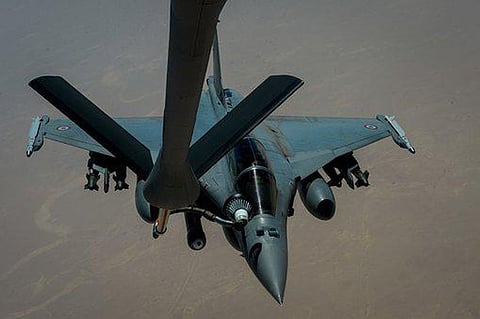The Rafale Deal: Corporate Rivalry Impacting National Interest
A recent European Union intelligence sharing exercise with India has revealed that Lockheed Martin, the US-headquartered company which manufactures the F-16 fighter jets, has been up to mischief mongering on the Rafale issue.
The Rafale jets, which India wants, is manufactured by the French aerospace company Dassault Aviation, a rival of Lockheed Martin.
That Lockheed Martin could be working in the shadows to sour the Rafale deal for India so that it could move in with its own deal was validated when Vivek Lall, Lockheed Martin's high-profile head of strategy and India operations, said that the company was in the process of finalising the sale of 200 fighters to India.
During the UPA regime, the government had signed an MoU for 126 Rafale fighter jets to replenish a major shortcoming in air defence preparedness because the Indian Air Force did not have quality fighter jets. When the NDA government led by Prime Minister Narendra Modi came to power, this deal was revised and an inter-government deal was struck to receive 36 fully-loaded Rafale jets. The controversy now raging in India is related to the pricing for the fighters negotiated by the NDA.
Defence Minister Nirmala Sitharaman has been obtuse in accusing the Congress of becoming a pawn in corporate rivalry. She made the comments during a recent seminar on 'India's strategic interest in the context of the Rafale deal'. Pixabay
In December when the Rafale case came before the Supreme Court, Chief Justice Ranjan Gogoi observed that processes were generally followed over the procurement. He also noted that the controversy had been triggered by comments by former French President Francois Hollande over the selection of the offset partner and that mere comments could not form the basis for a probe.
However, this has not prevented the Rafale purchase controversy from becoming a high-octane political battle between the Congress party and the Bharatiya Janata Party (BJP).
Repeatedly over the past few months and more stridently now in the lead-up to the Lok Sabha elections, Congress President Rahul Gandhi has led a no-holds barred attack on the government and the Prime Minister specifically on the issue. From the earlier public disinterest on the controversy, it is now now getting some traction — the Congress party believes this could be possible because it has relentlessly raised the matter at all public forums.
Bringing up the case of the state-owned Hindustan Aeronautics Ltd (HAL) was said to be part of the orhestrated plan to present the case of the American companies while also appearing nationalistic. In the government's estimate, HAL's record is abysmal and it cannot be given a big responsibility like building fighter jets — more so in the light of the safety record of MiG fighters purchased from Russia and made under licence from HAL.
The BJP-led government at the Centre believes — and it is certain it has evidence of this — that the Congress party is doing this as it has become a party to corporate rivalry between the US and French aerospace companies. For the record, Lockheed Martin is believed to have found a sympathetic ally in another US aerospace major, Boeing, which manufactures the F-18. Dassault has another rival in French manufacturer Airbus Industrie, which is associated with BAE for the manufacture of the Eurofighter. It is also angling for a fighter jet contract with India.
Rahul Gandhi's attacks on the government over the Rafale issue started after his visit to the US in August 2017 when he met several defence lobbyists, CEOs of US defence companies and Pentagon officials.
Defence Minister Nirmala Sitharaman has been obtuse in accusing the Congress of becoming a pawn in corporate rivalry. She made the comments during a recent seminar on 'India's strategic interest in the context of the Rafale deal'.
Contrary to popular perception, the Trump administration is said to be extremely unhappy with India because the NDA government under Modi has been successful in building strong relationships with Saudi Arabia, the United Arab Emirates and Qatar. Pixabay
The government's efforts to trace the footprints of the dramatis personae at the forefront of the campaign to target the government over the Rafale deal has produced surprising results. It has found what it believes are eye-opening linkages between Prashant Bhushan, Yashwant Sinha and Arun Shourie — who filed a PIL in the Supreme Court accusing the Prime Minister of corruption in the deal — and arms dealers and defence manufacturers. At least in one case, the linkages show deep connections between members of Shourie's family with aerospace companies, arms dealers and defence lobbies.
A deeper look found a correlation between the end of Shourie's dreams of being appointed Union Finance Minister and the beginning of his tirade against the Prime Minister on one issue or the other.
The government is also aware of the links between a top BJP leader's son-in-law and a French manufacturer. The son-in-law is said to be advising Rahul Gandhi and is believed to be making government documents available to him for the campaign against Rafale.
Lockheed Martin's alleged actions to work the political ecosystem to pull down the Rafale procurement deal also has a larger strategic context. Contrary to popular perception, the Trump administration is said to be extremely unhappy with India because the NDA government under Modi has been successful in building strong relationships with Saudi Arabia, the United Arab Emirates and Qatar. (IANS)


